Abstract
Studies of Mycobacterium leprae, Mycobacterium tuberculosis and Nocardia caviae in comparison with each other and with other Mycobacterium and Nocardia species were performed on the basis of antigen 21 intramolecular heterogeneity. Three different antisera were used: rabbit anti-Mycobacterium smegmatis antiserum, rabbit anti-Nocardia asteroides antiserum, and a lepromatous serum pool. With reference to each of the three antiserum sources used the strains were ranked in an order of relatedness or sharing of determinants. The three antisera showed distinctly different antigen 21 antibody specificities reflecting the species origin of the immunogen. The present investigations confirmed that antigen 21 of N. caviae shares determinants with antigens from Mycobacterium strains which were not present in corresponding antigens of all other Nocardia strains tested. M. tuberculosis, as judged by antigen 21 analysis, occupies a position separate from both the slow-growing and the fast-growing mycobacterial clusters in accordance with accepted taxonomic relationships. An interesting possibility of establishing a position for M. leprae in relation to other mycobacterial species was apparent. The order of relatedness among the strains studied went from M. leprae to M. tuberculosis to N. caviae to Mycobacterium avium to Mycobacterium fortuitum, the last two being representatives of the slow-growing and fast-growing mycobacteria. It can therefore be concluded that evidence from antigen 21 analysis indicates that M. leprae is more closely related to M. tuberculosis than to the other strains investigated.
Full text
PDF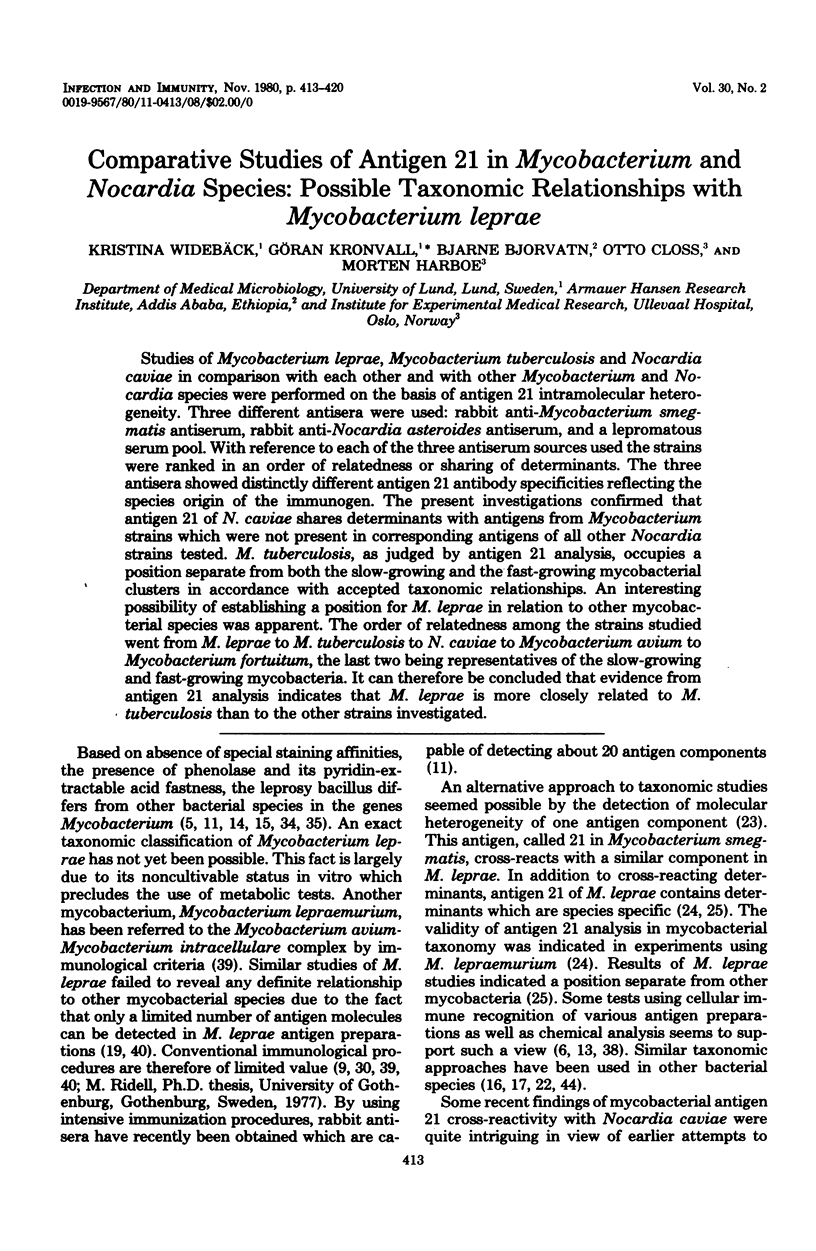
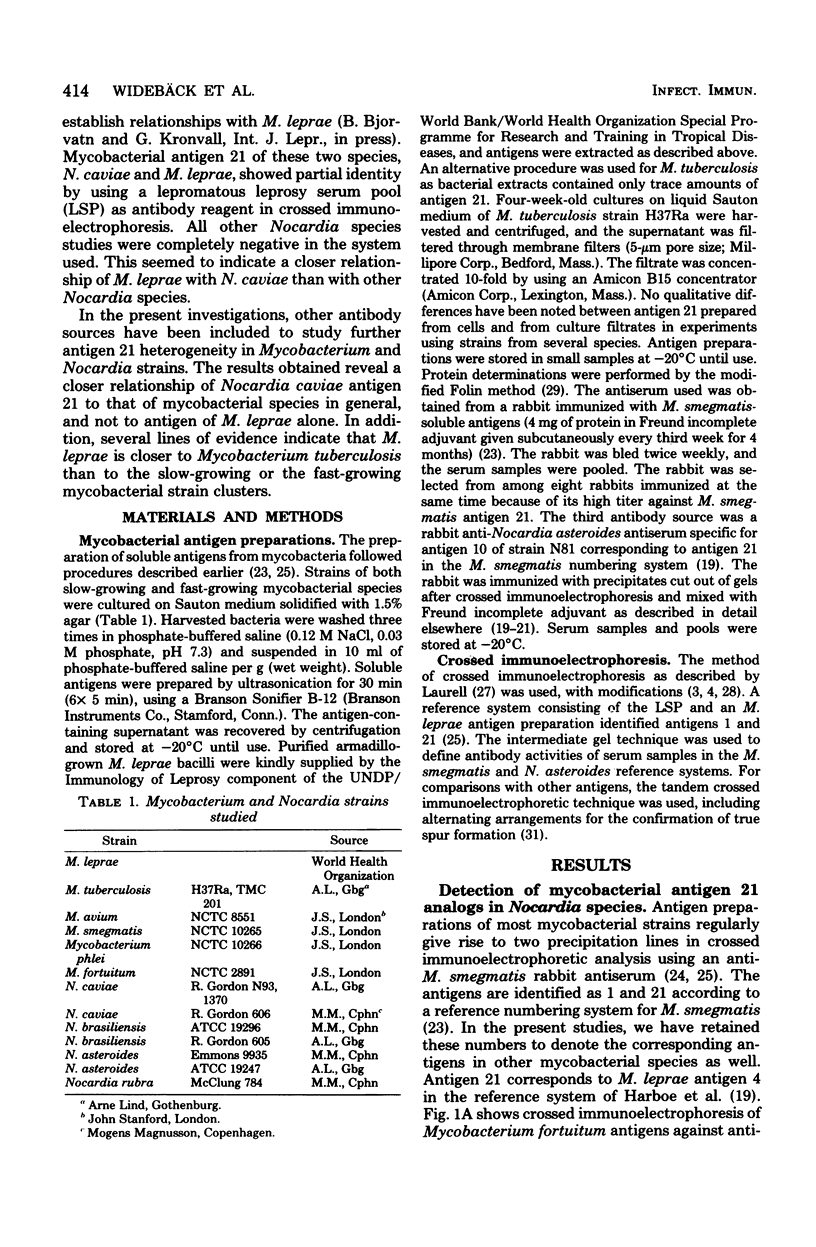
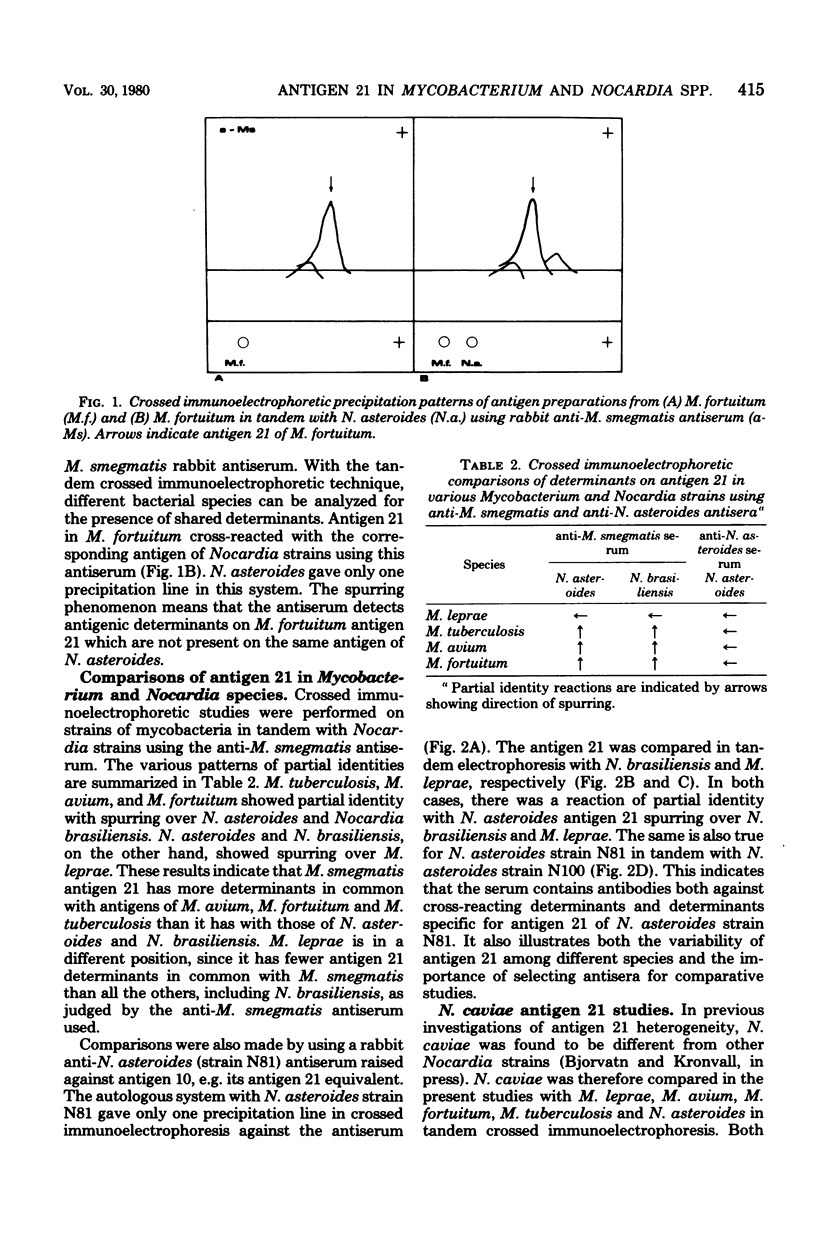
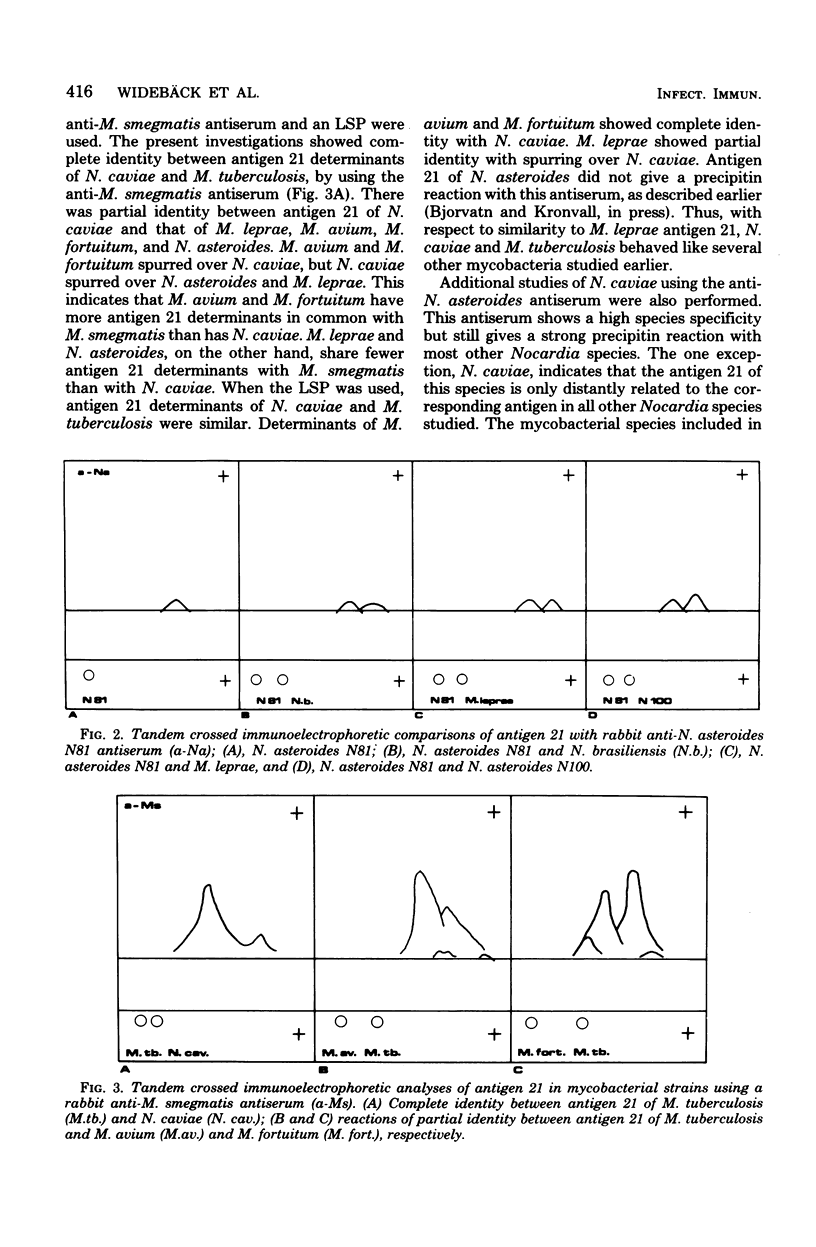
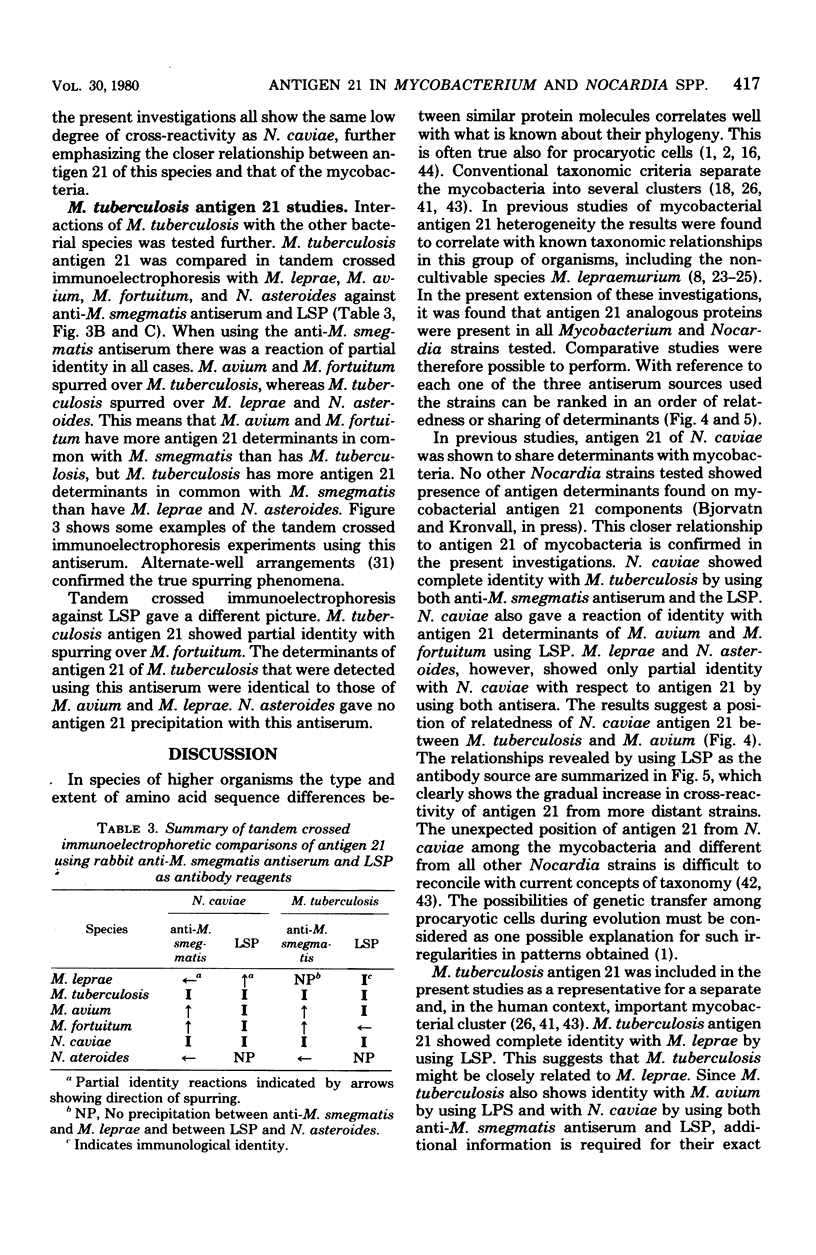
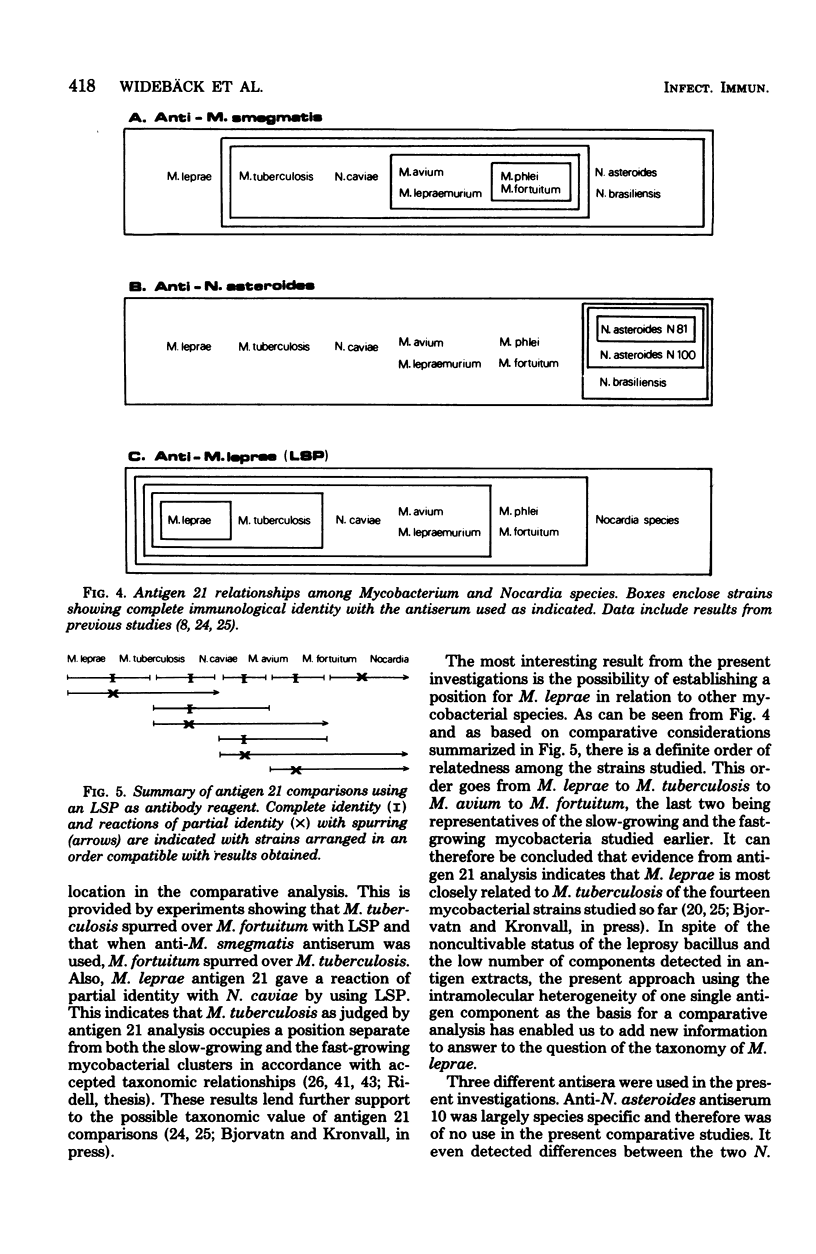
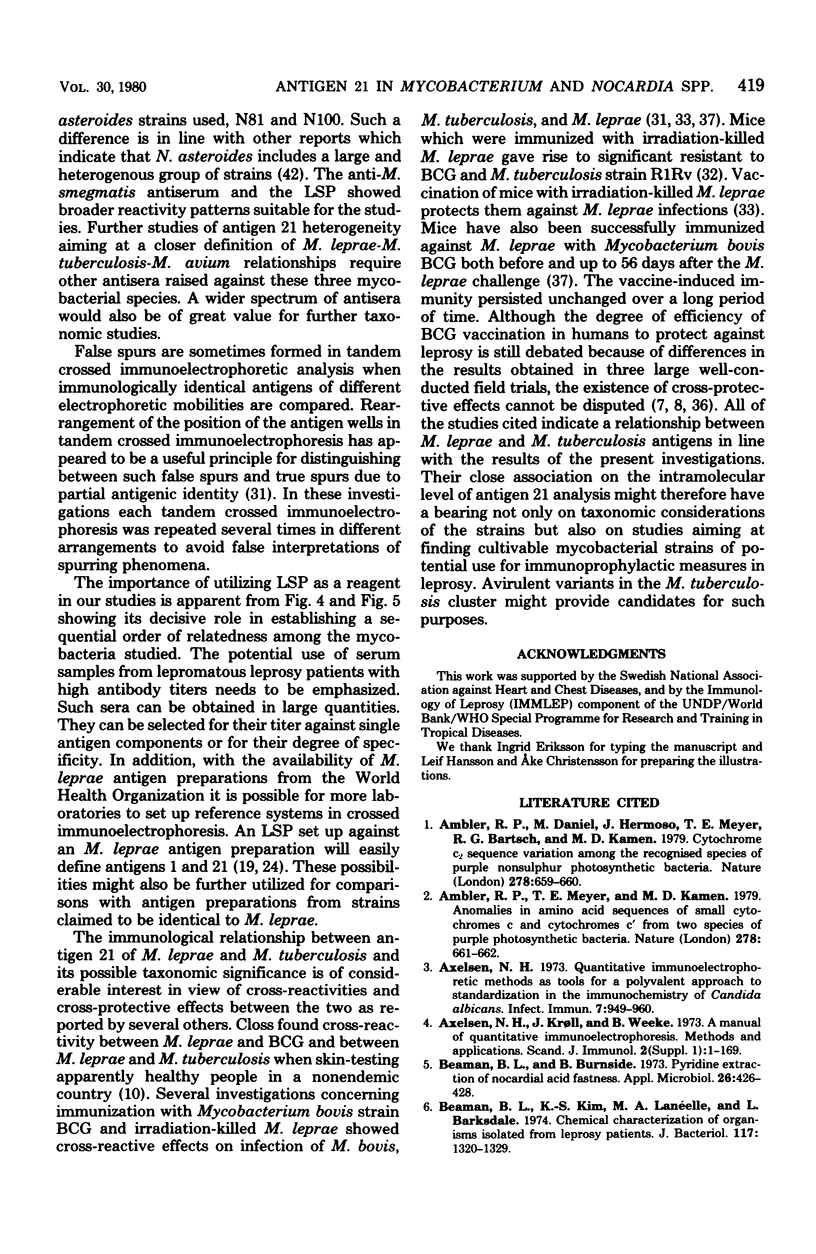
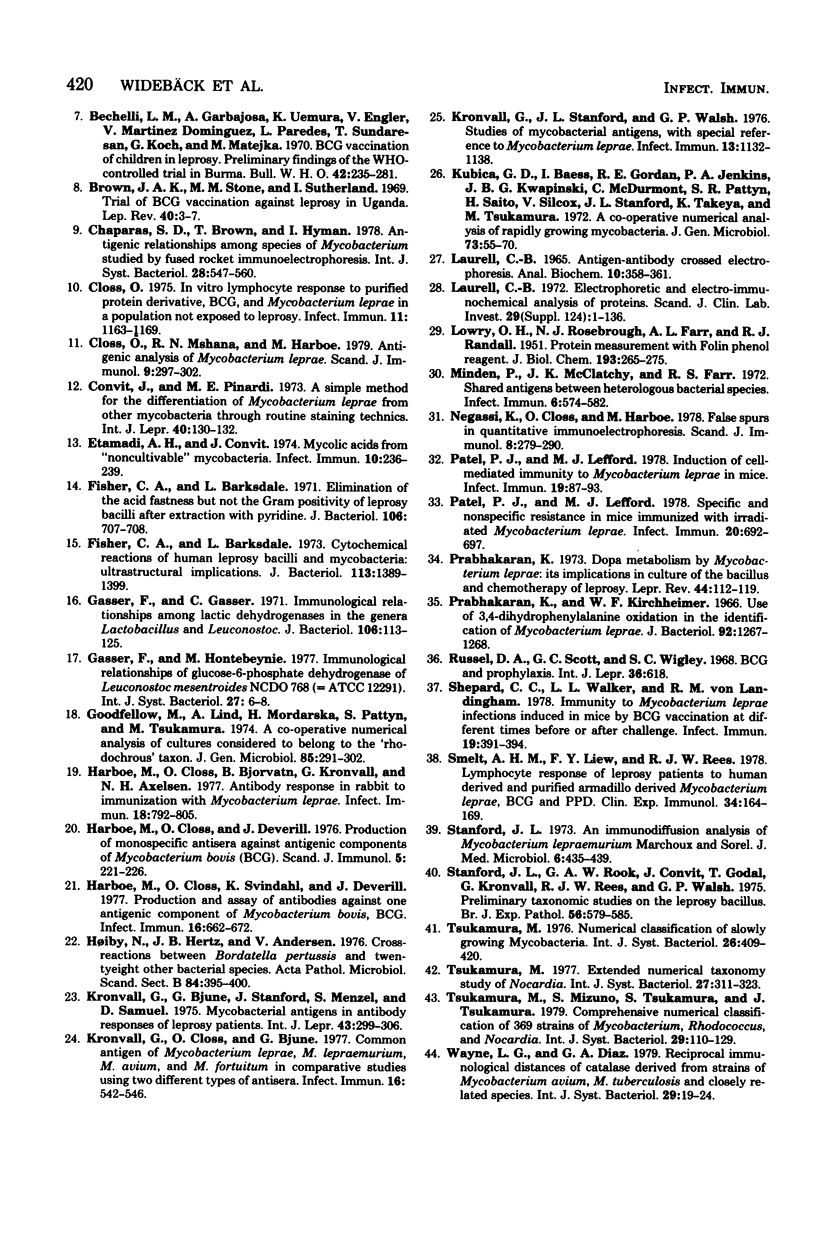
Selected References
These references are in PubMed. This may not be the complete list of references from this article.
- Ambler R. P., Daniel M., Hermoso J., Meyer T. E., Bartsch R. G., Kamen M. D. Cytochrome c2 sequence variation among the recognised species of purple nonsulphur photosynthetic bacteria. Nature. 1979 Apr 12;278(5705):659–660. doi: 10.1038/278659a0. [DOI] [PubMed] [Google Scholar]
- Ambler R. P., Meyer T. E., Kamen M. D. Anomalies in amino acid sequences of small cytochromes c and cytochromes c' from two species of purple photosynthetic bacteria. Nature. 1979 Apr 12;278(5705):661–662. doi: 10.1038/278661a0. [DOI] [PubMed] [Google Scholar]
- Axelsen N. H. Quantitative immunoelectrophoretic methods as tools for a polyvalent approach to standardization in the immunochemistry of Candida albicans. Infect Immun. 1973 Jun;7(6):949–960. doi: 10.1128/iai.7.6.949-960.1973. [DOI] [PMC free article] [PubMed] [Google Scholar]
- Beaman B. L., Burnside J. Pyridine extraction of nocardial acid fastness. Appl Microbiol. 1973 Sep;26(3):426–428. doi: 10.1128/am.26.3.426-428.1973. [DOI] [PMC free article] [PubMed] [Google Scholar]
- Beaman B. L., Kim K. S., Lanéelle M. A., Barksdale L. Chemical characterization of organisms isolated from leprosy patients. J Bacteriol. 1974 Mar;117(3):1320–1329. doi: 10.1128/jb.117.3.1320-1329.1974. [DOI] [PMC free article] [PubMed] [Google Scholar]
- Bechelli L. M., Garbajosa G., Uemura K., Engler V., Martínez Domínguez V., Paredes L., Sundaresan T., Koch G., Matejka M. BCG vaccination of children against leprosy. Preliminary findings of the WHO-controlled trial in Burma. Bull World Health Organ. 1970;42(2):235–281. [PMC free article] [PubMed] [Google Scholar]
- Brown J. A., Stone M. M., Sutherland I. Trial of BCG vaccination against leprosy in Uganda. Lepr Rev. 1969 Jan;40(1):3–7. doi: 10.5935/0305-7518.19690003. [DOI] [PubMed] [Google Scholar]
- Christophersen E. B. A pilot study of intra-aortic balloon counterpulsation. Mechanical analog studies biological tests. Scand J Clin Lab Invest. 1972;29:1–165. [PubMed] [Google Scholar]
- Closs O. In vitro lymphocyte response to purified protein derivative, BCG and Mycobacterium leprae in a population not exposed to leprosy. Infect Immun. 1975 Jun;11(6):1163–1169. doi: 10.1128/iai.11.6.1163-1169.1975. [DOI] [PMC free article] [PubMed] [Google Scholar]
- Closs O., Mshana R. N., Harboe M. Antigenic analysis of Mycobacterium leprae. Scand J Immunol. 1979 Mar;9(3):297–302. doi: 10.1111/j.1365-3083.1979.tb02735.x. [DOI] [PubMed] [Google Scholar]
- Convit J., Pinardi M. E. A simple method for the differentiation of Mycobacterium leprae from other mycobacteria through routine staining technics. Int J Lepr Other Mycobact Dis. 1972 Apr-Jun;40(2):130–132. [PubMed] [Google Scholar]
- Etemadi A. H., Convit J. Mycolic acids from "noncultivable" mycobacteria. Infect Immun. 1974 Jul;10(1):236–239. doi: 10.1128/iai.10.1.236-239.1974. [DOI] [PMC free article] [PubMed] [Google Scholar]
- Fisher C. A., Barksdale L. Cytochemical reactions of human leprosy bacilli and mycobacteria: ultrastructural implications. J Bacteriol. 1973 Mar;113(3):1389–1399. doi: 10.1128/jb.113.3.1389-1399.1973. [DOI] [PMC free article] [PubMed] [Google Scholar]
- Fisher C. A., Barksdale L. Elimination of the acid fastness but not the gram positivity of leprosy bacilli after extraction with pyridine. J Bacteriol. 1971 May;106(2):707–708. doi: 10.1128/jb.106.2.707-708.1971. [DOI] [PMC free article] [PubMed] [Google Scholar]
- Gasser F., Gasser C. Immunological relationships among lactic dehydrogenases in the genera Lactobacillus and Leuconostoc. J Bacteriol. 1971 Apr;106(1):113–125. doi: 10.1128/jb.106.1.113-125.1971. [DOI] [PMC free article] [PubMed] [Google Scholar]
- Goodfellow M., Lind A., Mordarska H., Pattyn S., Tsukamura M. A co-operative numerical analysis of cultures considered to belong to the 'rhodochrous' taxon. J Gen Microbiol. 1974 Dec;85(2):291–302. doi: 10.1099/00221287-85-2-291. [DOI] [PubMed] [Google Scholar]
- Harboe M., Closs O., Bjorvatn B., Kronvall G., Axelsen N. H. Antibody response in rabbits to immunization with Mycobacterium leprae. Infect Immun. 1977 Dec;18(3):792–805. doi: 10.1128/iai.18.3.792-805.1977. [DOI] [PMC free article] [PubMed] [Google Scholar]
- Harboe M., Closs O., Svindahl K., Deverill J. Production and assay of antibodies against one antigenic component of Mycobacterium bovis BCG. Infect Immun. 1977 May;16(2):662–672. doi: 10.1128/iai.16.2.662-672.1977. [DOI] [PMC free article] [PubMed] [Google Scholar]
- Høiby N., Hertz J. B., Andersen V. Cross-reactions between Bordetella pertussis and twenty-eight other bacterial species. Acta Pathol Microbiol Scand B. 1976 Dec;84B(6):395–400. doi: 10.1111/j.1699-0463.1976.tb01958.x. [DOI] [PubMed] [Google Scholar]
- Koch C., Nielsen H. E. Effect of anti light-chain antibodies on rat leukocytes in vitro. Scand J Immunol. 1973;2(1):1–8. doi: 10.1111/j.1365-3083.1973.tb02009.x. [DOI] [PubMed] [Google Scholar]
- Kronvall G., Bjune G., Stanford J., Menzel S., Samuel D. Mycobacterial antigens in antibody responses of leprosy patients. Int J Lepr Other Mycobact Dis. 1975 Oct-Dec;43(4):306–306. [PubMed] [Google Scholar]
- Kronvall G., Closs O., Bjune G. Common antigen of Mycobacterium leprae, M. lepraemurium, M. avium, and M. fortuitum in comparative studies using two different types of antisera. Infect Immun. 1977 May;16(2):542–546. doi: 10.1128/iai.16.2.542-546.1977. [DOI] [PMC free article] [PubMed] [Google Scholar]
- Kronvall G., Stanford J. L., Walsh G. P. Studies of mycobacterial antigens, with special reference to Mycobacterium leprae. Infect Immun. 1976 Apr;13(4):1132–1138. doi: 10.1128/iai.13.4.1132-1138.1976. [DOI] [PMC free article] [PubMed] [Google Scholar]
- Kubica G. P., Baess I., Gordon R. E., Jenkins P. A., Kwapinski J. B., McDurmont C., Pattyn S. R., Saito H., Silcox V., Stanford J. L. A co-operative numerical analysis of rapidly growing mycobacteria. J Gen Microbiol. 1972 Nov;73(1):55–70. doi: 10.1099/00221287-73-1-55. [DOI] [PubMed] [Google Scholar]
- LAURELL C. B. ANTIGEN-ANTIBODY CROSSED ELECTROPHORESIS. Anal Biochem. 1965 Feb;10:358–361. doi: 10.1016/0003-2697(65)90278-2. [DOI] [PubMed] [Google Scholar]
- LOWRY O. H., ROSEBROUGH N. J., FARR A. L., RANDALL R. J. Protein measurement with the Folin phenol reagent. J Biol Chem. 1951 Nov;193(1):265–275. [PubMed] [Google Scholar]
- Minden P., McClatchy J. K., Farr R. S. Shared antigens between heterologous bacterial species. Infect Immun. 1972 Oct;6(4):574–582. doi: 10.1128/iai.6.4.574-582.1972. [DOI] [PMC free article] [PubMed] [Google Scholar]
- Negassi K., Closs O., Harboe M. False spurs in quantitative immunoelectrophoresis. Scand J Immunol. 1978;8(4):279–290. doi: 10.1111/j.1365-3083.1978.tb00521.x. [DOI] [PubMed] [Google Scholar]
- Patel P. J., Lefford M. J. Induction of cell-mediated immunity to Mycobacterium leprae in mice. Infect Immun. 1978 Jan;19(1):87–93. doi: 10.1128/iai.19.1.87-93.1978. [DOI] [PMC free article] [PubMed] [Google Scholar]
- Patel P. J., Lefford M. J. Specific and nonspecific resistance in mice immunized with irradiated Myobacterium leprae. Infect Immun. 1978 Jun;20(3):692–697. doi: 10.1128/iai.20.3.692-697.1978. [DOI] [PMC free article] [PubMed] [Google Scholar]
- Prabhakaran K. Dopa metabolism by Mycobacterium leprae: its implications in culture of the bacillus and chemotherapy of leprosy. Lepr Rev. 1973 Sep;44(3):112–119. doi: 10.5935/0305-7518.19730017. [DOI] [PubMed] [Google Scholar]
- Prabhakaran K., Kirchheimer W. F. Use of 3,4-Dihydroxyphenylalanine Oxidation in the Identification of Mycobacterium leprae. J Bacteriol. 1966 Oct;92(4):1267–1268. doi: 10.1128/jb.92.4.1267-1268.1966. [DOI] [PMC free article] [PubMed] [Google Scholar]
- Samarut C., Brochier J., Revillard J. P. Distribution of cells binding erythrocyte-antibody (EA) complexes in human lymphoid populations. Scand J Immunol. 1976;5(3):221–231. doi: 10.1111/j.1365-3083.1976.tb00273.x. [DOI] [PubMed] [Google Scholar]
- Shepard C. C., Walker L. L., Van Landingham R. M. Immunity to Mycobacterium leprae infections induced in mice by BCG vaccination at different times before or after challenge. Infect Immun. 1978 Feb;19(2):391–394. doi: 10.1128/iai.19.2.391-394.1978. [DOI] [PMC free article] [PubMed] [Google Scholar]
- Smelt A. H., Liew F. Y., Rees R. J. Lymphocyte response of leprosy patients to human-derived and purified armadillo-derived Mycobacterium leprae, BCG and PPD. Clin Exp Immunol. 1978 Nov;34(2):164–169. [PMC free article] [PubMed] [Google Scholar]
- Stanford J. L. An immunodiffusion analysis of Mycobacterium lepraemurium Marchoux and Sorel. J Med Microbiol. 1973 Nov;6(4):435–439. doi: 10.1099/00222615-6-4-435. [DOI] [PubMed] [Google Scholar]
- Stanford J. L., Rook G. A., Convit J., Godal T., Kronvall G., Rees R. J., Walsh G. P. Preliminary taxonomic studies on the leprosy bacillus. Br J Exp Pathol. 1975 Dec;56(6):579–585. [PMC free article] [PubMed] [Google Scholar]


